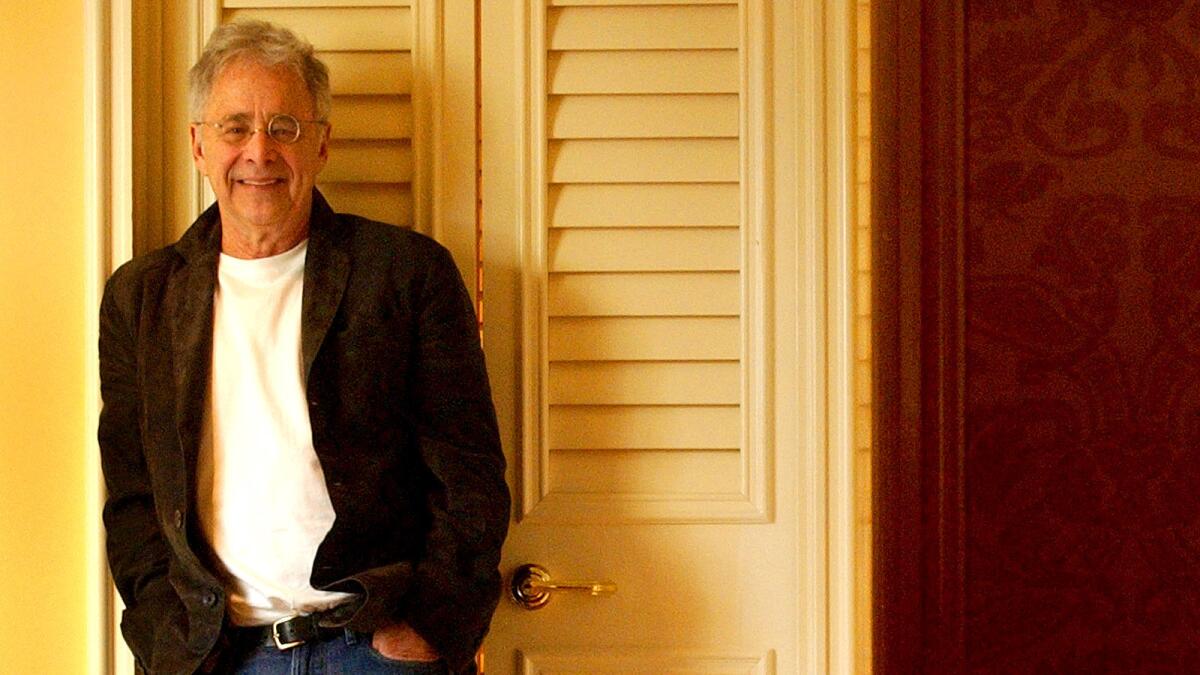From the Archives: Chuck Barris: The man with the dangerous mind returns

- Share via
Chuck Barris, creator of shows like “The Newlywed Game” and popular host of “The Gong Show,” has died. He was 87. As the 2002 biographical film “Confessions of a Dangerous Mind” was set to debut, The Times’ Roy Rivenburg sat down with Barris to talk.
After two decades of self-imposed exile in southern France, the curly-haired creature who brought us “The Gong Show,” “The Newlywed Game” and other TV schlock is back.
Chuck Barris sinks into a stuffed chair in his Beverly Hills hotel room and marvels at the turn of events. “Two years ago, I was sitting in Columbia-Presbyterian hospital in New York with lung cancer,” he says. His second marriage was over, he had just buried his mother and his own life seemed to be slipping away.
Today, the 73-year-old game-show mogul is remarried (to a 43- year-old ex-model), embarking on a singing career, writing his fourth book and basking in the publicity surrounding “Confessions of a Dangerous Mind,” the film based on his bizarre memoir about being a CIA assassin.
“Who would’ve guessed it?” says Barris, whose 1970s-era wide lapels and big bow tie have given way to a suede jacket, jeans and granny glasses. “Everything is brand new.”
Yet Barris is haunted by the past. He blames himself in the death of his adult daughter in 1998. He frets that the only accomplishment he’ll be remembered for is “The Gong Show.” And he’s still wounded by the lambasting his TV shows endured more than 20 years ago.
Although such fare as “The Dating Game” and “The $1.98 Beauty Show” might seem tame by today’s standards, critics of the era derided them as trashy and demeaning to contestants.
“I took the criticism so hard,” says Barris, who intended the shows as nothing more than good fun. “I don’t know if I’ll ever get over it.”
But he did devise an intriguing response. In the early 1980s, he pulled the plug on his television empire, barricaded himself inside a Wyndham Hotel suite and penned “Confessions of a Dangerous Mind: An Unauthorized Autobiography.”
In it, Barris made the astonishing claim that while he was being “crucified” by critics for “polluting the airwaves with mind- numbing puerile entertainment,” he was simultaneously receiving presidential citations for his work as an undercover CIA assassin. He said some of the killings were carried out while he chaperoned winning “Dating Game” couples to such destinations as “romantic West Berlin.”
Could it possibly be true?
In a media kit for the film version of “Confessions,” which opens Tuesday, director George Clooney says, “There is something shockingly fascinating about someone of his wealth and fame who would want to say this about himself.... Whether it’s true or not is in Chuck’s head.... I’ve asked [him] about the specifics of the story, and he would look me in the eyes and not say anything.”
Barris is equally mysterious with reporters. Although he admits that one of his other books, the 1974 bestseller “You and Me, Babe,” was a fictionalized account of his first marriage, when he is asked how much of “Confessions” is fantasy, he says, “I’ll never answer that question.”
Even his wife, Mary, is evasive. “After I met Chuck, I read the book and I didn’t really place any judgment on it one way or the other. Chuck and I never talk about whether he really did it.”
Meanwhile, in Virginia, CIA officials seem amused by the saga. “It sounds like he might have been standing too close to the gong all those years,” says CIA spokesman Tom Crispell. “Chuck Barris has never been employed by the CIA. And the allegation that he was a hired assassin is absurd.”
Barris waves off the rebuttal, saying: “Have you ever heard the CIA acknowledge someone was an assassin?” To skeptics, he adds, “Believe what you want. I wrote the book and that’s how I felt when I wrote it.”
The CIA story isn’t the only questionable claim he makes. There’s also the matter of who created “The Dating Game.” In “Confessions,” Barris takes full credit for the idea. But a 1980 Times article indicates someone else might have been involved. While discussing lawsuits over Barris shows that were “created or co-created by others,” his sidekick Budd Granoff acknowledged that Barris’ company settled a suit out of court around 1970 regarding creation of “The Dating Game.”
When asked for details last week, Barris declined through his publicist to comment.
But even if some aspects of his newly reissued autobiography are embellished, Barris’ story is still remarkable. The son of a Philadelphia dentist, he reportedly held jobs as a TelePrompTer salesman, steelworker, songwriter (Freddie Cannon’s 1962 hit “Palisades Park” is credited to him) and NBC tour guide before climbing the food chain at ABC and finally forming his own production company. In 1965, he launched “The Dating Game,” which revolutionized TV game shows. Next came “The Newlywed Game,” “The Game Game” and a Mama Cass special, among others.
“Those were the happiest days of my life,” Barris says. “It was Camelot.”
A 1969 Times article described his company as “a swinging, with- it outfit” staffed by “super-cool chicks in miniskirts clacking away on typewriters.” The office walls were “a freaky collage of pop- hippie art,” and Barrissported “a groovy mod haircut.”
A few years later, in 1976, he debuted his signature program, “The Gong Show,” a wacky amateur talent contest that featured such acts as the Unknown Comic (a guy with a bag over his head), Gene Gene the Dancing Machine and a woman who whistled “I’m Looking Over a Four-Leaf Clover” through her nose. Barris emceed the shenanigans, and such luminaries as David Letterman and Jaye P. Morgan served as judges. When an act was really lame, the panelists clanged a huge gong to get them offstage.
The secret to Barris’ success, wrote Maxene Fabe in “TV Game Shows,” was that he was “the first man in America to realize how desperately ‘ordinary’ people want to be on television.”
Today, he has mixed feelings about the show. “It was four years of total fun,” he says, but it also consumed his life. “It was all I did, seven days a week,” and there was a casualty: his daughter, Della, who was a teen when “The Gong Show” began.
Barris, who took custody of Della after divorcing his first wife, had enrolled her in a private school. “But she wanted to go to Beverly Hills High, and I let her,” he recalls. “She got lost. I wasn’t giving her the proper ... “
His voice trails off.
In high school, Della got involved in drugs and Barris didn’t know what to do. He took her to psychiatrists and finally settled on a “tough love” approach.
“It didn’t work. You lose ‘em and they rarely come back.”
Della left home at age 16 and never beat her drug problem, he says. In 1998, Barris flew out from New York for one of his periodic visits with her, only to get a message upon arriving that she had just died of an overdose. “I was absolutely floored,” he says.
One of his most painful memories is of taking Della to a “Gong Show Movie” screening in 1980. “When she came on the screen [Della had been an occasional guest on the show], the audience booed,” Barris says. “She ran out of the theater.”
Barris soon made an escape of his own. After his film tanked at the box office, he gonged himself off the public stage. “I figured I didn’t have my finger on the pulse of what’s going on anymore, so I took off,” he says. His shows were getting canceled, critics were hammering him, and so he moved to St. Tropez, France, with his future second wife, Robin Altman. He later sold his TV business to a conglomerate that manufactured cement.
“They say if you can’t take the heat, get out of the kitchen. Well, I got out of the kitchen and went to France, but I should’ve stayed. It was a big, big mistake.”
By the time he was ready to make a comeback in the 1990s, TV executives regarded him as a dinosaur. They might be right, he concedes. Although some critics consider him the godfather of modern shows like “Fear Factor” and “Survivor,” Barris insists he “couldn’t think of those shows if you put a gun to my head.”
I believe we’re going to eventually have somebody killed on TV.”
— Chuck Barris
He believes game shows are on a path he’s no longer attuned to. “I believe we’re going to eventually have somebody killed on TV,” he says. “They’re already showing autopsies on TV in London. There is no end to how low TV will go to get an audience.”
So Barris has turned to other projects. Dividing his time between an apartment in Manhattan and a stone cottage on the Hudson River in Sneden’s Landing, N.Y., he is finishing the sequel to his CIA memoir, tentatively titled “Bad Grass Never Dies: More Confessions of a Dangerous Mind.”
Barris also serves on the New York Police Foundation’s board. And he recently taped some public service ads for lung cancer prevention. Noting that his own tumor was detected during a CAT scan of a shoulder injury, Barris “begs people” to get checkups: “If you see cancer on a lung X-ray, it’s too late. CAT scans can find it early.”
But most of his attention has been focused on the filming of his autobiography. Barris met with actors, faxed memos to the producer (“I have fax-itis,” he says) and played a cameo as himself. He is thrilled with the final product. “I sure wish Della could have seen this movie,” he says wistfully. “She would’ve loved it.”
Barris’ other new venture is singing. “I was thinking, what can I do to take advantage of this wave of publicity [for the movie],” he says. “So I got all the ‘Gong Show’ musicians together and we cut a CD.”
He hasn’t landed a record contract yet, but he did perform at New York’s Carnegie Hall as part of a benefit concert. “I’ve never been so scared in my life,” he says of the moment before going onstage. “I couldn’t breathe.”
But the audience was great, he says: “The applause after the first song, there’s nothing like it.... It was the most memorable moment of my life. If they ask me to play next year, I won’t do it because nothing will beat that.”
Plus, he knows adulation can be fleeting.
“My life has always been ups and downs. This is all going to be gone in a month or two and we’ll just go back to enjoying simple things again -- books, movies, dinner with friends, fixing up our little house.”
And how would he like to be remembered when his time is up? Not the way he knows he will be.
“I’ve always been second,” he says. “I’ve created hit TV shows, but nothing has been great. I’ve written rock songs, but I’m not a big music star. I’ve penned a bestselling book, but I’m not Hemingway or Fitzgerald. I’ve never saved any lives. It’s just middle-of-the-road greatness. So I know what my legacy will be. It’s ‘The Gong Show’ and that’s a shame. It’s not the legacy I want to have. It gave the impression of me being a clown, a court jester. None of that’s true.”
His big fear, he admits, is that the headline on his obituary will say, “Barris gets gonged.”
But he’s not wild about being remembered as a CIA gunman, either. “The persona of me in the movie is 180 degrees from the real me,” he says. “I’m quiet and well-read.”
Meeting Barris in person, it’s hard to imagine him as the central character in his book -- a raunchy, cold-blooded assassin who kicks his dog, uses women and spends thousands of dollars on abortions for his girlfriends.
Receiving visitors in his Beverly Hills hotel room, he comes across as serious and reflective.
So, if he could go back in time, would he pass on “The Gong Show”? “No, I would do it all again. If you gave me a choice to go back and erase all that, I’d hate to lose the good times.”
See the most-read stories in Entertainment this hour >> »
More to Read
The complete guide to home viewing
Get Screen Gab for everything about the TV shows and streaming movies everyone’s talking about.
You may occasionally receive promotional content from the Los Angeles Times.






